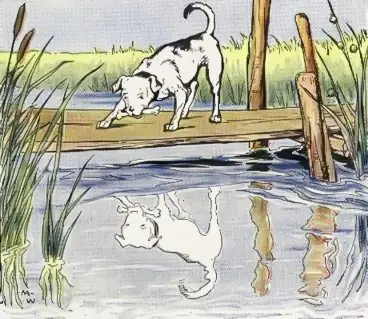The Dog and the Shadow (from the Fables of Aesop)

Ագահն որչափ շատին ցանկայ,
Այնչափ աղքատ խեղճ կը մնայ։
Շուն մը
Շունը տաքարիւն կենդանի ըլլալով շուտով կը փոփոխի, եւ օրինակ է շահասէր մարդու. որ վաստակի սիրով մէկ բանը կը ձգէ մէկալին ետեւէն կը վազէ. եւ անով ձեռքի եղածն ալ կը կորսնցնէ։ Հարցուցին Բիաս փիլիսոփային թէ ո՞վ է մեծատուն. պատասխանեց թէ այն՝ որ բանի մը չի ցանկար։
A Dog, crossing a little rivulet with a piece of flesh in his mouth, saw his own Shadow represented in the clear mirror of the limpid stream; and, believing it to be another dog, who was carrying another piece of flesh, he could not forbear catching at it; but was so far from getting any thing by his greedy design, that he dropped the piece he had in his mouth, which immediately sunk to the bottom, and was irrecoverably lost.
He that catches at more than belongs to him justly deserves to lose what he has. Yet nothing is more common, and, at the same time, more pernicious, than this selfish principle. It prevails from the king to the peasant; and all orders and degrees of men are, more or less, infected with it. Great monarchs have been drawn in, by this greedy humour, to grasp at the dominions of their neighbours; not that they wanted any thing more to feed their luxury, but to gratify their insatiable appetite for vain-glory. If the kings of Persia could have been contented with their own vast territories, they had not lost all Asia for the sake of a little petty state of Greece. And France, with all its glory, has, ere now, been reduced to the last extremity by the same unjust encroachments.
He that thinks he sees another's estate in a pack of cards, or a box and dice, and ventures his own in the pursuit of it, should not repine if he finds himself a beggar in the end.


Comments
Post a Comment